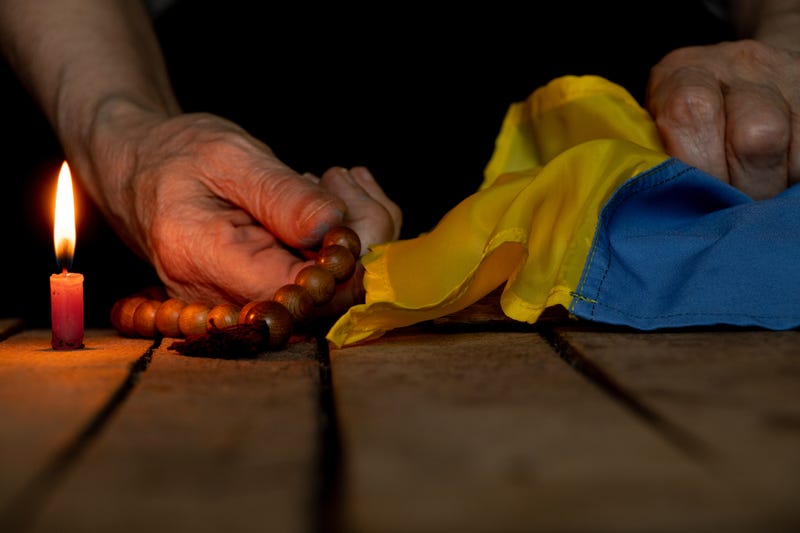
This story is part of a KYW Newsradio series looking back on how the war in Ukraine continues to affect the Philadelphia region a year after the Russian invasion.
PHILADELPHIA (KYW Newsradio) — More than 147,000 Ukrainians have been authorized to book passage to the United States through a government sponsorship program, including thousands who have settled in Pennsylvania. According to one immigrant services nonprofit, not all those settlements have been successful.
Most of the Ukrainians who have come to the Philadelphia area are not legally designated as refugees, but they are entering through a program called Uniting for Ukraine, which expedites their arrival.
“It means that Ukrainians who find sponsors — Americans who have sufficient income and assets to support them for two years — are permitted to enter the country as sponsored immigrants, as humanitarian parolees, for two years,” said immigration attorney Catherine Miller-Wilson.
Miller-Wilson is the head of HIAS Pennsylvania, a nonprofit that provides legal and social services to at-risk immigrants and refugees. She says the problem is that many of those arrangements have fallen through or become too much of a burden for the American sponsors.
The refugees are the lucky ones
“This program, in my opinion, has been somewhat disastrous,” Miller-Wilson said.
“We have seen many, many sponsorships break down so that Ukrainians that we're serving are seeking housing, which is not something that we are funded to provide.”
Many who have come to the Philadelphia region after escaping the war with Russia, she says, are now facing the possibility of eviction, or they’re living in overcrowded conditions — and it’s putting a strain on local resettlement efforts.
“We're scrambling to provide temporary free housing, with some of the options that we have cultivated over the years for our refugee clients who fall into difficult circumstances. But those are obviously temporary, and they're not ideal,” Miller-Wilson said. “So it's very, very, very challenging.”
The good news is that HIAS’s refugee resettlement program has just recently started seeing Ukrainians who have been cleared through the refugee process. Miller-Wilson says these Ukrainians designated as refugees are the “very lucky” ones.
“They get all the benefits of a refugee, and they get the services of agencies like ours to help resettle them,” she said.
If more Ukrainians can come across the border as refugees, there will be fewer problems, she said, but the early sponsored immigrants still need help.
And housing isn’t the only problem. Huntington Valley immigration attorney Igor Voloshen says those sponsored Ukrainians were supposed to be issued temporary work visas upon arrival in the United States, but misunderstandings about the Uniting for Ukraine program have caused delays.
“So, when people will come up and show them these documents — which is really just a piece of paper that says you're authorized to come to the U.S. — they will say, ‘Where's your visa?’”
In addition, he said, Uniting for Ukraine also set up temporary benefits, including medical care and SNAP assistance — “but, in order to apply for those, they need Social Security numbers. Now you can’t get a Social Security number unless you are issued a work authorization.”
Voloshen says some arrivals had to wait as long as three or four months — “which would drive them to do one of two things: either not work and fall into poverty and sometimes even have to sleep in shelters; or the other, violate U.S. labor law and immigration law by working without work authorization.”
Voloshen says some people had no choice but to return to Europe, which was difficult because of the language barrier. Many Ukrainians who learned English in school do not know languages like German, Italian or Spanish, he said.
But Voloshen says it all changed in the fall, as a new surge of emigration from Ukraine was starting.
“In September and October of 2022, a class-action lawsuit was filed, suing the U.S. government and getting them to comply with their own directives.”
More than 6 million people from Ukraine, in one way or another, have been displaced, Voloshen said.
Alone in a foreign land
For people like 28-year-old Liliia Krabtsova, the bureaucratic Catch-22 made for a rough transition.
“Unfortunately, my work authorization came to me after three months. It wasn't good, because I haven't money. My parents and my relatives, they stay in Ukraine,” Krabtsova said.
Overnight, she went from working as an attorney and having family support in Ukraine to being a lone evacuee in a foreign country.
“In Ukraine I had a master's degree,” she said. “And I can start to have a diploma here, but it's so expensive.”
Krabtsova doesn’t have a license to practice law in the United States, but when she finally got her work authorization, she was able to find work as a paralegal. She says adjusting to her new life has been challenging but not impossible. She says she’s grateful for the opportunity to live here.
“I should say thanks [to every American who supports] our country, our democracy, because we want to [survive] and want to live in freedom.”
When she’s not working, Krabtsova takes English classes. She has been able to save up enough money to rent an apartment, buy a car, get her own medical insurance and car insurance and live on her own.
However, she said, she worries about her retired parents, who are still in Ukraine — and her brother, who is fighting to defend her country. And she is worried about what will happen to herself. Her stay in the United States is temporary and her work authorization through Uniting for Ukraine is valid for two years only.
“You start a new life, new job, education to build your life again — and you don't know what will be after two years. It sounds scary for me,” she said.
U.S. Immigration and Customs Enforcement has not responded to requests from KYW Newsradio for comment.




